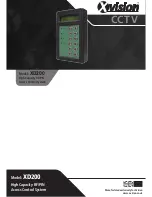
4
SafeGuard Controller User Manual
MAN-0115 Rev 0
1.2 SPECIFICATIONS:
1.2.1
DC POWER SUPPLY REQUIREMENTS
Standard SafeGuard Controller power requirements are 10-30VDC @ 3 watts applied to
terminals 9 & 11 of TB2 on the standard I/O PCB (see section 3.0). Optional features
increase power consumption as described below:
•
Discrete Relay PCB option; add 2 watts per PCB (assumes all 8 relays are energized).
•
Analog Input PCB option; add 1/2 watt.
•
4-20mA Output PCB option; add 1 watt.
•
TB2 terminals 10 & 12 of the standard I/O PCB provide a maximum of 500mA fused
output power for powering of auxiliary external devices such as relays, lamps or
transmitters. Power consumed from these terminals should be considered when
calculating system power consumption.
When wiring transmitters (detectors) to the SafeGuard Controller refer to 3.1.1
Optional Analog Input PCB # SG10-0158 and Figure 3.3.
1.2.1a 150 WATT AC – 24VDC POWER SUPPLY
*110-120 VAC @3.2A max
*220-240VAC @ 1.6A max
* A slide switch on the front of the power supply selects AC input range.
The SG10-0172 150 watt power supply (Figure 3.6) is for powering the SafeGuard
Controller and up to 16 detectors. A minimum of 5 watts per channel is available for
powering of external transmitters.
1.2.2 RELAYS
Common relays are standard and menus provide voting logic for ALARM 1,
ALARM 2, FAULT and HORN. Discrete relays are optional. Relays are Form
C dry contacts and are rated at 5 Amp for 28 VDC and 250 ~VAC
RESISTIVE
loads.
IMPORTANT
: Appropriate diode (DC loads) or MOV (AC loads) snubber devices
must be installed with inductive loads to prevent RFI noise spikes. Relay wiring should
be kept separate from low level signal wiring.
1.2.3 AMBIENT
TEMPERATURE
RANGE
-25 to +50 degrees C
1.2.4 HUMIDITY
RANGE
0 to 90% R. H. Non-Condensing.
1.2.5 ALTITUDE
Recommended up to 2000 meters
!








































